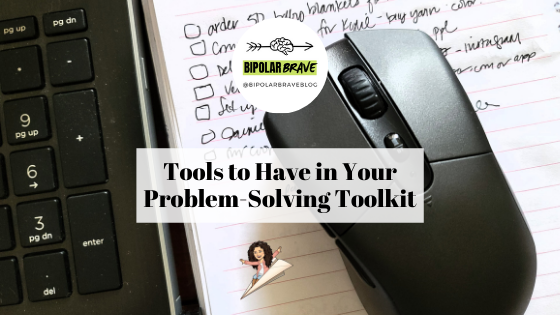The solutions to the problems that arise in our everyday lives are never just one step away. There are always going to be issues we face in life that call on our intellect and common sense, which we will need to address as efficiently and competently as possible. Here is a start to a few tools for your problem-solving toolkit that you will want to use and reuse. Take a look:
-
Mind-Mapping
– if you have time and you’re in a brainstorming capable environment, definitely take advantage of this method. For a relevant post on mind-mapping check this post out.

-
Daily Planner
– to fail to plan, is to plan to fail. So true. Take a look at what planners and bullet journaling can do to help prevent possible problems from arising, and then go forward and put it in practice. For more on bullet journaling, search YouTube for “bullet journaling” and be prepared to be amazed…

-
Idea Log
– this can be in the form of a bullet journal, like mentioned above, a Rolodex, or a file on your computer. Or you can make a list on a scrap paper for all it’s worth. Let your mind wander and percolate answers for you. I personally like to use Google Keep Notes app on my Android to jot down ideas on lists when they come to me.
-
Ask an Expert
— that’s what Google, Siri and Alexa are for, don’t you know? But also, don’t forget to call on those subject matter experts. In the mental health field, you shouldn’t hesitate to reach out to the professionals in any intrapersonal or interpersonal matter. That is, see a psychiatrist for mood disorder medication, a therapist for mood disorder management/cognitive reprocessing, a peer support specialist/hope coach for morale natural support.

-
Problem Processor
– most formal problem analysis tools are in steps. Try the following 6 step method when you are stuck with a problem you can realistically write down, that may be complex.

See http://www.free-management-ebooks.com/news/six-step-problem-solving-model/ for a more in-depth look at this method.
-
Ask Yourself (HALT)
– sometimes our internal, personal problems are those sneaky little thoughts that turn into feelings that lead to unwanted and ugly behaviors. And that’s a problem. So ask yourself the following, remembering the HALT acronym. Am I:
- Hungry?
- Angry?
- Lonely?
- Tired?
If you are one of these, you may be at risk of an issue. Two of these combined needs not met will cause more issues. Three, even more, and so on.
-
Analysis Quadrant
– wanting change and you can’t seem to decide, because your ambiguity is getting the better of you…well look no further to weigh out your decision to make a move by using an analysis quadrant. Here’s how:

-
Educate AKA Other resources
(therapists, books, podcasts) – sometimes, a solitary tool as those above won’t cut it. You need in depth resources that have answers already spelled out and verified. Educate! Go to see a therapist for wise counsel. Read books (for practical problem solving I recommend ThinkerToys) and listen to podcasts, TEDtalks, and sermons.
If you gleaned some good ideas to implement here on this post, check out BipolarBrave.com/resources for your opportunity to download a problem-solving (AND PREVENTING) mental health resource guide: The GAMEPLAN.

What do you think?